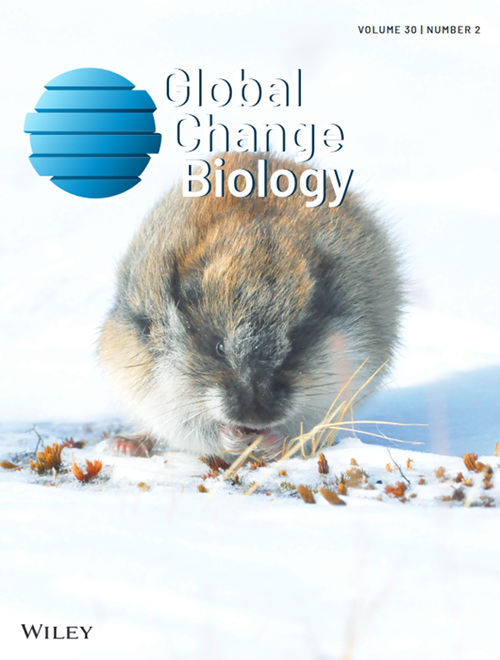Widespread but Divergent Drought Legacy Effects on Gross Primary Productivity Across Biomes
IF 12
1区 环境科学与生态学
Q1 BIODIVERSITY CONSERVATION
引用次数: 0
Abstract
Drought can impact terrestrial ecosystems concurrently but also lagged in time, that is, through legacy effects. Drought legacy effects have been identified in parameters such as tree radial growth or satellite‐based greenness. Evidence in ecosystem‐scale fluxes, for example, gross primary productivity (GPP), is emerging, but still limited to individual sites or specific regions. Based on GPP data at 76 long‐term (≥ 7 years) eddy‐covariance sites across climates and biomes, we found drought legacy effects for 26 out of 52 droughts, with magnitudes comparable to the drought concurrent effects and lasting typically up to 1 year following drought. These effects diverged in direction: 19 events led to reduced GPP in the following years (negative legacy effects), while 7 showed increased GPP (positive legacy effects). Forests experienced more negative legacy effects than non‐forest ecosystems. Legacy effects were more pronounced in forests with higher hydraulic vulnerability. Our findings demonstrate the global relevance of drought legacy effects on GPP and the need for their integration into drought impact assessments.干旱对生物群系总初级生产力的影响
干旱可以同时影响陆地生态系统,但也会在时间上滞后,即通过遗留效应。干旱遗留效应已在树木径向生长或卫星绿度等参数中得到确认。生态系统尺度通量方面的证据正在出现,例如,总初级生产力(GPP),但仍然局限于个别场地或特定区域。基于气候和生物群系中76个长期(≥7年)涡旋相关点的GPP数据,我们发现52次干旱中有26次存在干旱遗留效应,其量级与干旱同期效应相当,且通常在干旱后持续长达1年。这些影响在方向上存在分歧:19个事件导致GPP在随后几年下降(负遗留效应),而7个事件显示GPP增加(正遗留效应)。森林生态系统比非森林生态系统具有更大的负面遗产效应。遗留效应在水力脆弱性较高的森林中更为明显。我们的研究结果证明了干旱遗留效应对GPP的全球相关性,以及将其纳入干旱影响评估的必要性。
本文章由计算机程序翻译,如有差异,请以英文原文为准。
求助全文
约1分钟内获得全文
求助全文
来源期刊

Global Change Biology
环境科学-环境科学
CiteScore
21.50
自引率
5.20%
发文量
497
审稿时长
3.3 months
期刊介绍:
Global Change Biology is an environmental change journal committed to shaping the future and addressing the world's most pressing challenges, including sustainability, climate change, environmental protection, food and water safety, and global health.
Dedicated to fostering a profound understanding of the impacts of global change on biological systems and offering innovative solutions, the journal publishes a diverse range of content, including primary research articles, technical advances, research reviews, reports, opinions, perspectives, commentaries, and letters. Starting with the 2024 volume, Global Change Biology will transition to an online-only format, enhancing accessibility and contributing to the evolution of scholarly communication.
 求助内容:
求助内容: 应助结果提醒方式:
应助结果提醒方式:


